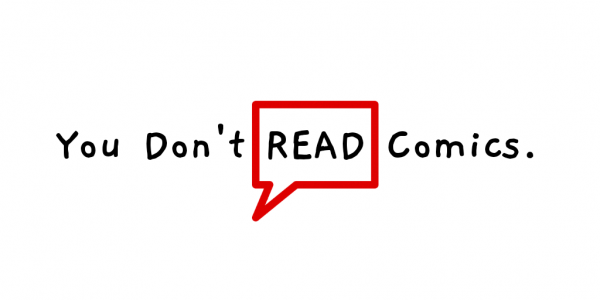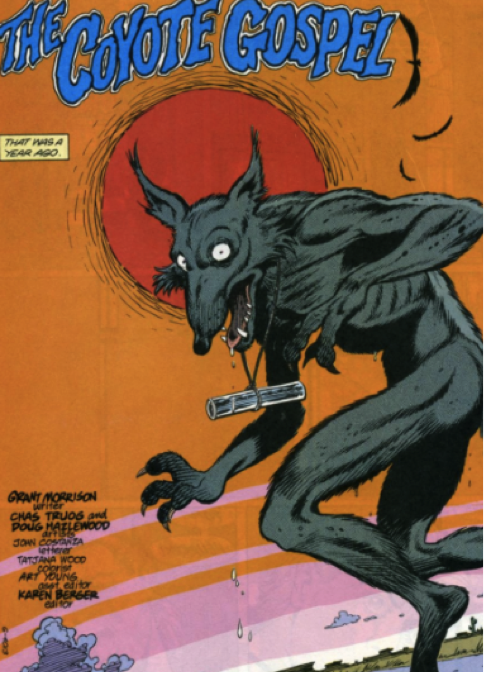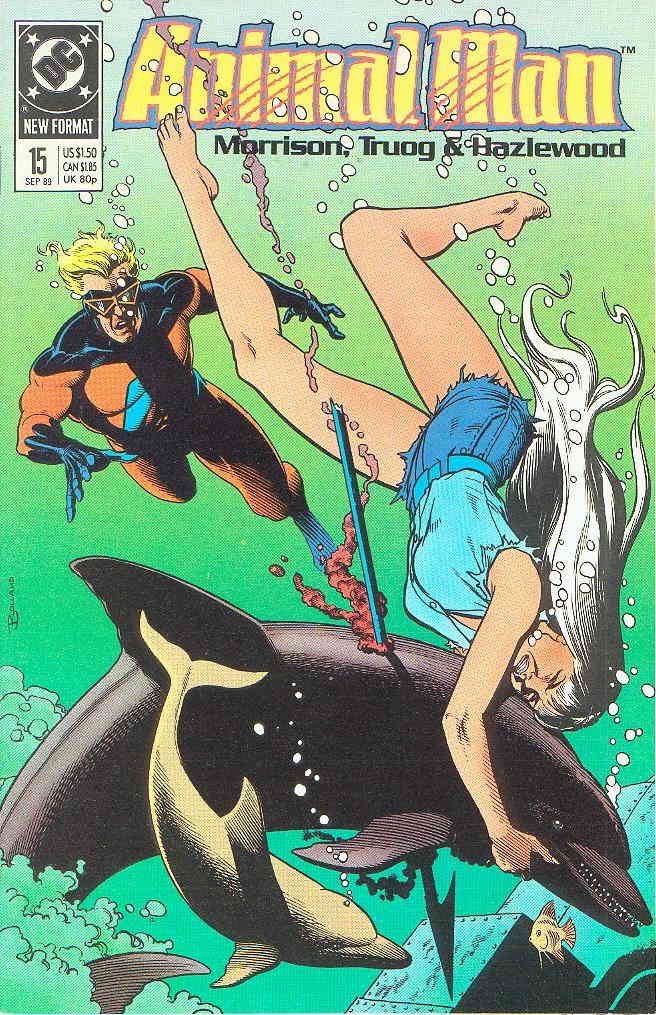Let's Talk About Grant Morrison's Animal Man
Hi, I’m David Harth, and I’m sorry that this article is a week late. Life gets in the way, and I am nothing if not a tortured artist (well, I’m definitely tortured, not much of an artist), so it took me a bit to get the wherewithal to write this. Depression is not fun, folks.
Aaaaannnnndddddd, we’re in TMI territory.
So, today, we’re going to talk about Grant Morrison and Chas Troug’s (with the occasional art assist from Tom Grummet, a guy who doesn’t get enough credit for just how great he was in the 90s) Animal Man. When I say that, I don’t mean I’m going to summarize the series for you. I’m not going to spoil the plotlines, not really, or give away the big moments. I want you to read it yourself and experience it that way. What I’m going to talk about is the themes of the book. High falutin’ stuff like that.
Okay, I’m going to spoil one issue, but it’s important to the overall tenor of our little one-way conversation.
So, some history. Morrison was one of the British Invasion guys who came after Alan Moore. I think we all know this. Animal Man was one of his first works at DC. At first, it was just supposed to be a four-issue mini but got picked up as an ongoing. The first four issues were fairly standard superhero stuff. Morrison did some cool things with Buddy Baker’s animal powers (Baker can have the abilities of any animal around him, a power which eventually becomes any animal). It’s pretty great, introduces his family, all that.
Then comes issue 5, “The Coyote Gospel.”
Basically, a very familiar cartoon coyote escapes his fictional world to the real world of the DCU to try and get the people to stop torturing his people for entertainment. Unfortunately, when he came to this new world, a trucker crashed and died, and his friend (there are some heavy implications that they were gay lovers) is hunting down the beast he thinks of as a devil, looking for revenge.
This sort of metafictional narrative is the series in microcosm.
Animal Man has a lot of elements. First off, it’s just a great superhero series. Morrison, who had written for British publications before this, knows how to keep the readers hooked. Buddy is a likable guy, and he fights for what he believes is right. This eventually becomes animal rights, and Buddy goes so far as to become a vegetarian to put his money where his mouth is on the saving animal's front. He goes on missions with animal rights groups to stop fox hunts and things like that. One of the better instances of this is issue 15, “The Devil And The Deep Blue Sea,” where he goes to the Faroe Islands to stop a festival where people slaughter dolphins. It guest stars the aquatic heroine Dolphin. It’s great.
One of the next elements of the book is the beautiful family dynamic the Bakers have. Buddy is married and has two kids. His wife, Ellen, is an artist, and his two kids, Cliff and Maxine, are your prototypical hellion and precocious youth, respectively. There’s a wonderful interplay between them, and you can feel the love the family has for each other. It’s very rare in comics for a family dynamic to play out this well. They aren’t a dysfunctional family. Buddy doesn’t pull a Reed Richards and neglect them for his superhero-ing. They are just a solid family unit, and it’s heartwarming.
Morrison plays with elements of Crisis On Infinite Earths throughout the book. Buddy Baker of this series is very different from the pre-Crisis version, and Morrison uses this to set up some rather interesting stories. The first of those stories involve two aliens coming down to “fix” Buddy, and this gives him his greater powers that he’ll use throughout the series, connecting him to the “morphogenetic field.” This story (which co-stars Vixen and is in issues 10, 11, and 12) also ends with the aliens taking out the villain of the piece in a very novel way- they basically erase his drawing in stages.
Psycho Pirate is also in the book, and I love Psycho Pirate way more than I should. At one point, he tries to undo Crisis and bring back the multiverse using his Medusa Mask, which starts to manifest all the beings of the pre-Crisis multiverse that only he can remember. This issue comes near the end of the book, after a lot of big things that I’m not going to talk about happening, but just know that it’s really worth reading.
The thing about the book, though, is that as it goes on, you get this feeling that something’s not quite right. That there’s a mysterious hand-making all these things happen, these huge, improbable things involving the universe and all that. There are even scenes of a word processor screen in some issues (I mean, it might be a computer, but you have to realize, in the 80s, computers weren’t nearly as good as they are now and you could buy ones that were just for writing). One with a rather ominous take on Einstein’s quote about how God doesn’t play dice with the universe, but the person typing does.
Retroactively, the book was made part of the Vertigo imprint, and there’s definitely a lot of the weird, wild things in it that would be a hallmark of Vertigo books. It was violent and bit mature, but it was still just lighthearted enough at times to not be grimdark…. well, until the end, but we’re going to be getting to the reason behind that (but not the events)... Oh, how about now?
So, like I said way back there, “The Coyote Gospel” is the series in microcosm. At its core, this book is all about the relationship we have with our fictional characters. The coyote comes to the DCU with a message, to stop torturing his people for entertainment. That they are real and feel pain and just want to live happy lives like people. Unfortunately for him, he dies just as he delivers this message…. which Buddy can’t read anyway because it’s written in a gibberish cartoon language. The last two panels of the book show a brush coloring in the scene of his death.
Morrison repeatedly gives readers glimpses of things like this, because he wants us to know that this isn’t just a comic world, but it’s also our world interacting with it. I’m going to spoil the last issue of the run. If you don’t know this by now, well, you’re about to learn. All of those glimpses, the brush, the word processor screens, all of it (and there are more, I think, but I have a full-time job, and a baby and I haven’t had time to re-read the whole series before doing this, sue me… or use my name to find me on Facebook and send me some money… hint hint {The management is quite sorry for Mister Harth’s blatant disregard for propriety and his asking you for money. He is a bad man with a lovely one-year-old daughter and a Disney World addiction. Don’t give him any money.}) It leads up to Morrison appearing in the book to talk to Buddy.
He reveals to Buddy his fictional nature but also tells him a truth- that Buddy Baker will outlive Grant Morrison. He’ll outlive all of us reading the book. Then, Morrison gets to the meat of the thing, the lines that really define the whole story- that all the pain and suffering of our fictional characters is entertainment for us. That all the blood and torture excites us. That maybe, for once, we should try and be kind. He then goes and undoes all the terrible things he did to Buddy, resetting the book for the next writer to come in and take over.
Now, when you read this, and you think about humanity and our stories, doesn’t it chill you a bit? Think about all the pain and suffering you’ve witnessed as entertainment. What does it say about our world? What does it say about us that we have to torture our creations for entertainment? I’ve written some fiction which will probably never see the light of day. I created people out of nothing but my imagination and some archetypes. Then, I went on to kill them, torture them, make them fight each other. I did this to entertain an audience that they will never have. I also thought up lives for them. They have pasts and loves and hates and feelings. When I would write them, it didn’t feel like I was putting words in their mouths, but like I was channeling them from somewhere else. It felt more like they were telling me what to say and what they were doing in any given situation.
They were my babies, and I did terrible things to them in the hope that I could sell a novel, which I’ll now probably never let anyone else read. What does that say about me?
Fiction is our way of looking at the world, of forgetting about the world. It’s very important, but what do we want out of it? Most often, blood. Blood and physical and emotional anguish. One of Morrison’s points is that in comics, they added violence over the years to make them more mature, more realistic. He then says, “God help us if that’s what it means.” Does violence make fiction more real? Do we need our heroes to be tormented, violent souls righting wrongs with their fists and killing their enemies? Do we need to watch them lose everything they love? Does their pain make it more entertaining? More real?
The best part about this, beyond the “God help us” line, is that Morrison doesn’t make a judgment either way. He leaves that up to us, the reader. Sure, he does something at the end that can definitely be looked at as a judgment on the whole thing, but really, he was just kind for once. He was making up for his actions from before. At no point, though, does he say it’s wrong, not really. He just realizes in his little way, he’s adding to the suffering of the universe and does something about it.
Morrison would play with metafiction a lot more in his career, but this was the genesis. It’s an ambitious beginning, to say the least. Animal Man isn’t the first comic to showcase one of its creators in a starring role, but it’s the first to have that creator talk to the character he’s writing about the real world and the comic one, the way they work together. It’s also one of the most thought-provoking examples of it. Without this book, I never would have thought about how we treat our fiction. It made me look at things differently and made me question a society where so much of entertainment is just a more sanitized of the Roman’s blood and circuses. We like to think humanity has changed, that we’ve outgrown our barbarism, and in some ways, we are right. Is it any less barbaric, though, to create characters just for the express purpose of tormenting them for our entertainment? Is it right to, as the saying goes, “kill our babies” for entertainment?
Animal Man asks a lot of great questions if you let it, but beyond that, it’s just a great superhero book. Buddy is a fun character to spend time with, and his family is great. There’s a lot of action and drama and the mind-bending stuff that Morrison does so well. For my money, it’s one of those seminal comics works that anyone who is really serious about studying the medium should read. There’s so much going on it, on so many levels, and it all works.
I hope this little late article makes you go out and pick it up. There’s so much more in it than what I’ve described. Anyway, join me next week when I try and wax poetic about Morrison’s Doom Patrol. It might not be as long winded as this. It’s always possible.








